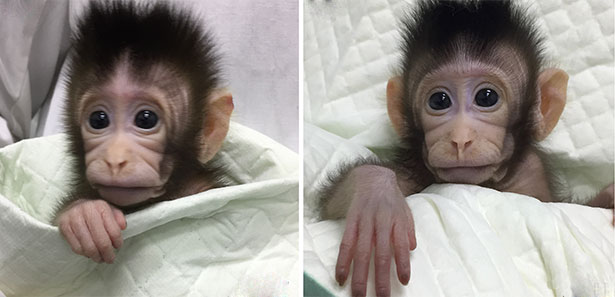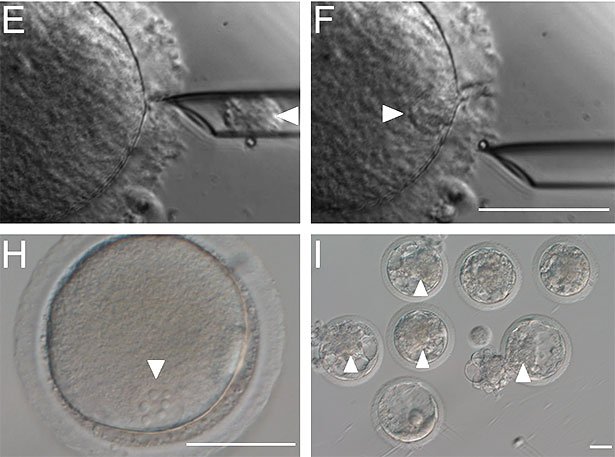Infant monkeys cloned
Two macaque babies are the first living primate clones using the 'Dolly method'
Cloned primates: For the first time, Chinese researchers have cloned monkeys using the 'Dolly method'. As with the famous cloned sheep, the two healthy young animals were created by the fusion of reprogrammed body cell nuclei with decored ova - a process that had previously failed with primates. The successful cloning of long-tailed macaques could now open up new possibilities for research - but it is also a methodological step towards ethically controversial human cloning.

These two cute little monkey babies are the first primates cloned using the 'Dolly' method. © Qiang Sun and Mu-ming Poo / Chinese Academy of SciencesThe clone sheep 'Dolly' made the beginning: In 1996, its birth proved that cloning from already differentiated mammalian body cells is possible. For this so-called somatic nuclear transfer, the nucleus of a body cell is removed and transplanted into a decored egg cell. There, it is put back into the embryonic state by the environment, as well as slight surges of current or chemical additives - its genetic material is reprogrammed.
As a result of this manipulation, a normal embryo develops, which is genetically an identical copy of the cell nucleus donor - a clone. In this way, researchers have already cloned 23 species of mammals - including pigs, cattle, mice, cats and dogs.
Primates are difficult
However, this cloning method has so far been unsuccessful with monkeys - and thus with our next of kin. The reason for this is that in primates, cells that have already been differentiated cannot be returned to the embryonic state as easily as in other mammals. The only monkey clone so far - a rhesus monkey - was created by the division of embryos. In principle an artificially produced twin.
Now, however, Zhen Liu and his colleagues from the laboratory for primate neurobiology in Shanghai seem to have succeeded in overcoming the hurdles in the reprogramming of primate cells. They used special enzymes to remove blockages in the genes of the implanted cell nucleus. This enabled them to bring the genetic material back to its original embryonic state.
109 clone cells - two live monkey babies

Injection of a fibroblast cell nucleus into the decored egg cell (E-F), fusion of the nucleus with the egg cell (H) and blastocysts (I) resulting from the nucleus transfer. © Chinese Academy of Sciences, Sun et al. /CellHowever, with adult monkey cells this method was only successful to a limited extent - the monkey clones did not survive long. The researchers therefore used the connective tissue cells of a long-tailed macaque fetus as cell nucleus donors for their successful cloning experiment. They removed these fibroblasts from the cell nucleus, transplanted them into a previously decored egg cell and treated the whole thing with their enzyme cocktail.
Of the 109 cloned eggs produced in this way, 79 developed further. The researchers transferred them to 21 macaque females as surrogate mothers. A month later, check-ups showed that four of these female monkeys were pregnant - cloned monkey cubs developed in them. However, two of these unborn babies were miscarried after two months, the researchers report. The other two ape cubs were born by caesarean section.
'A methodical success'
The two monkey babies - baptized Zhong-Zhong and Hua-Hua - are the first living monkeys produced by the Dolly method. So far, they seem to develop quite normally despite their unusual origin:
Both babies are in good condition, Liu and his colleagues report. This proves that cloning of non-human primates through somatic nucleus transfer is feasible.
However, it is still too early to rule out late effects of cloning in animals.
Nevertheless, other scientists also regard this experiment as a success:
From a technical and methodological point of view, this work is clearly progress, comments Rüdiger Behr from the German Primate Center in Göttingen. Biologically, the new procedure is also a step towards human beings.
However, human cloning is still strictly forbidden in most countries for ethical reasons.
Useful but controversial
For medical research, however, cloned monkeys could certainly bring advantages: Since genetically identical animals can be produced using this method, researchers can investigate the malfunctions or functions of individual genes on such clone monkeys more specifically.
This enables us to create models for genetic brain diseases, cancer, immune or metabolic diseases in humans and to better test the efficacy of drugs, according to Liu and his colleagues.
However, the use of apes in research is anything but uncontroversial, as the researchers admit:
We are well aware that future research with non-human primates depends on the researchers adhering to very strict ethical standards, they emphasize.
Source: Cell, 2018; doi: 10.1016/j. cell. 2018.01.020

Zhong zhong and hua-hua look really adorable. 😁
The idea of cloning has always been intriguing to me .
But its also scary to think that if cloning begins to happen in humans some may usr it for evil
Haha, yeah they really do... Cloning is indeed fascinating and on the other side scary, as you say.
Have you ever watched the movie:
The Island
Definitely a must...
The Island
Ive not watched it but now you've mentioned it . ill be sure to search for it
Oh great post..Loved your information abou apes and yes it said that people were apes at starting...Loved your educational post ..Glad to see it..@n3blu4
Seems like you didn't even read the post... ;-)
Good post, request you to follow me and upvote please. I am also following and upvoting you.
Thank you
https://steemit.com/@yousufpatan
Sorry, but you are neighter following me nor did you upvote my post....
Congratulations! This post has been upvoted from the communal account, @minnowsupport, by n3bul4 from the Minnow Support Project. It's a witness project run by aggroed, ausbitbank, teamsteem, theprophet0, someguy123, neoxian, followbtcnews, and netuoso. The goal is to help Steemit grow by supporting Minnows. Please find us at the Peace, Abundance, and Liberty Network (PALnet) Discord Channel. It's a completely public and open space to all members of the Steemit community who voluntarily choose to be there.
If you would like to delegate to the Minnow Support Project you can do so by clicking on the following links: 50SP, 100SP, 250SP, 500SP, 1000SP, 5000SP.
Be sure to leave at least 50SP undelegated on your account.
This post has received a 0.73 % upvote from @booster thanks to: @n3bul4.
Twins monkey :p science miracle :p